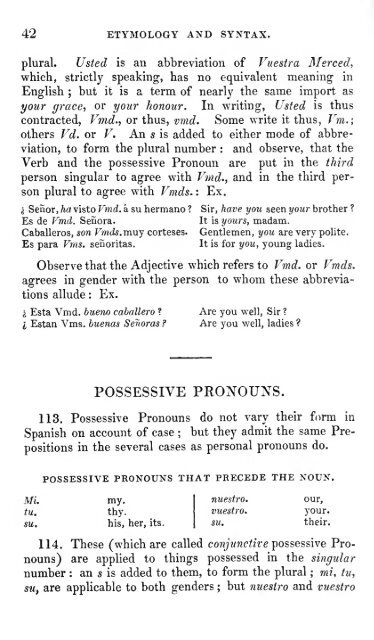A concise and simplified grammar of the Spanish language
A concise and simplified grammar of the Spanish language
A concise and simplified grammar of the Spanish language
Create successful ePaper yourself
Turn your PDF publications into a flip-book with our unique Google optimized e-Paper software.
42 ETYMOLOGY AND SYNTAX.<br />
plural. listed is an abbreviation <strong>of</strong> Vuestra Merced,<br />
which, strictly speaking, has no equivalent meaning in<br />
English ; but it is a term <strong>of</strong> nearly <strong>the</strong> same import as<br />
your grace, or your honour. In writing, Usted is thus<br />
contracted, Vrnd., or thus, vvid. Some write it thus, Vm. ;<br />
o<strong>the</strong>rs Vd. or V, An s is added to ei<strong>the</strong>r mode <strong>of</strong> abbre-<br />
viation, to form <strong>the</strong> plural number : <strong>and</strong> observe, that <strong>the</strong><br />
Verb <strong>and</strong> <strong>the</strong> possessive Pronoun are put in <strong>the</strong> third<br />
person singular to agree with Vmd., <strong>and</strong> in <strong>the</strong> third person<br />
plural to agree with Vmds. : Ex.<br />
¿ Señor, ha visto Fmd. á su hermano ? Sir, have you seen your bro<strong>the</strong>r ?<br />
Es de Vmd. Señora. It is yours, madam.<br />
Caballeros, son Vmds.mxiy corteses. Gentlemen, you are very polite.<br />
Es para Vms. señoritas. It is for you, young ladies.<br />
Observe that <strong>the</strong> Adjective which refers to Vmd. or Vmds.<br />
agrees in gender with <strong>the</strong> person to whom <strong>the</strong>se abbreviations<br />
allude : Ex.<br />
¿ Esta Vmd. bueno caballero ? Are you v^^ell, Sir ?<br />
I Estan Vms. buenas Señoras ? Are you well, ladies ?<br />
POSSESSIVE PRONOUNS.<br />
113. Possessive Pronouns do not vary <strong>the</strong>ir form in<br />
but <strong>the</strong>y admit <strong>the</strong> same Pre-<br />
<strong>Spanish</strong> on account <strong>of</strong> case ;<br />
positions in <strong>the</strong> several cases as personal pronouns do.<br />
Mi.<br />
POSSESSIVE PRONOUNS THAT PRECEDE THE NOUN.

















